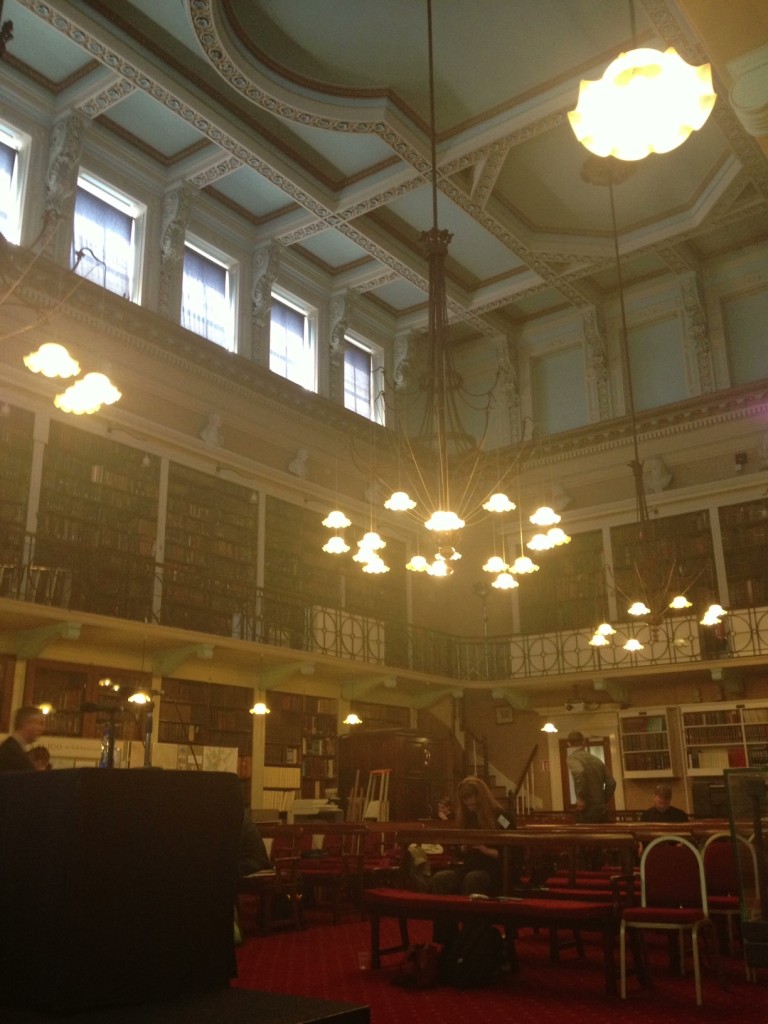On 4th June 2013 I attended the first day of Trust and Digital Preservation organised by the Alliance Permanent Access to the Records of Science in Europe Network (APARSEN) at the elegant library of the Royal Irish Academy, Dublin.
We were welcomed by William Kilbride, Executive Director of the Digital Preservation Coalition (DPC) and given an Introduction to the APARSEN Project [PDF] by Sharon McMeekin of DPC/APARSEN.
We then moved on to detail: an Introduction to the Digital Repository of Ireland [PDF] by Natalie Harrower of The Digital Repository of Ireland (DRI). I liked the range of demonstrator projects: an interface showing what was in the media on a certain date which linked straight to scanned newspapers and TV and radio listings, recorded life stories, archives of the business of making stained glass windows by Harry Clarke, recordings of Irish language broadcasts, and writing and photographs of lovely objects designed in the Kilkenny Design Workshops.
Documenting Authenticity and Provenance [PDF] by Mariella Guercio from the Italian Consorzio Interuniversitario Nazionale per l’Informatica (CINI) / APARSEN.
Trust in the (digital) world operates within history; it is related to concepts of place and responsibility; it implies trustful relationships between the entities (organizations and individuals) involved and mechanisms and services by which it can be established, implemented, promoted, verified
The presentation goes into useful detail of projects of documentation and tools and how for example logging changes fits into building trust in a preservation process such as format updating and so the institution doing it. I’ve been a long time follower of Bruce Schneier and digital security and it was good to be thinking in this systematic way.
The last speaker before lunch was Aileen O’Carroll of DRI on Social Science Data – strategies for sharing [PDF] with discussed examples of ethical issues of consent in the social sciences including simple risk analysis.
Lunch was good and I got to chat with delegates from around Ireland and Scotland – often charged with preserving national heritage including someone who studied Museum Studies at Leicester.
The afternoon saw three detailed and connected talks: Audit and Certification, the European Landscape [PDF] by Ingrid Dillo of Data Archiving and Networked Services (DANS) in the Netherlands/APARSEN, Audit and Certification, an Auditors Perspective [PDF] by Barbara Sierman of Koninklijke Bibliotheek (KB) – National Library of the Netherlands /APARSEN and Trust and Digital Preservation Professionals [PDF] by Laura Molloy of the Humanities Advanced Technology and Information Institute (HATII) at University of Glasgow / Digital Curator Vocational Education Europe (DigCurv).
The first two talks were about the emerging standards for digital preservation and those who would audit more formally certified archives. I was pleased to see how far the standards had progressed since I sat on very early panels on data preservation and data quality before the ISO (International Organization for Standardization) standards tracks got started.
The final talk was on the creation of a curriculum framework for vocational training for digital curators in libraries, archives and museums. This including highly detailed one-page framework “lenses” giving overviews of what practitioners, managers and executives might each want to learn. The learning areas are made up of Knowledge and Intellectual Abilities, Personal Qualities, Professional Conduct and Management and Quality Assurance and levels of training are defined between basic, intermediate and advanced.
We had some discussion amongst the room on the issues raised in the day. My brain was then full and it was time to go back out into the sunshine.
Thanks to the Man in Seat 61 advice on travelling to Ireland.


 Subscribe to 's posts
Subscribe to 's posts
Recent Comments